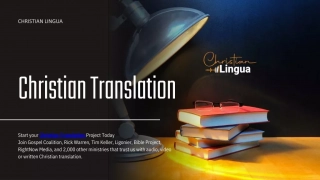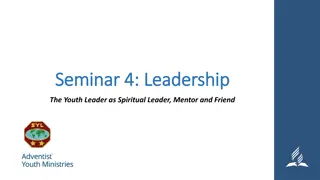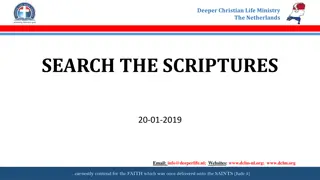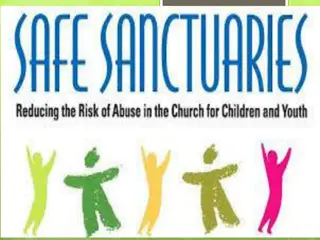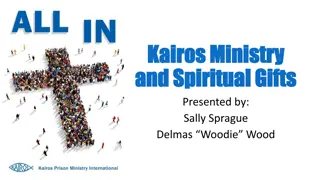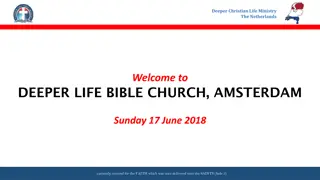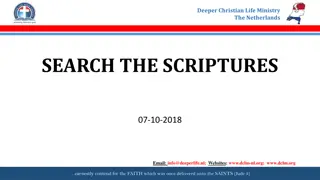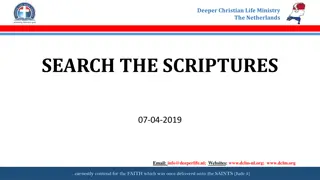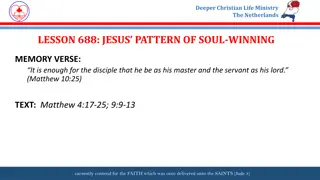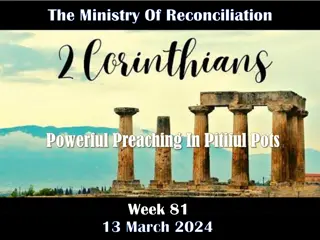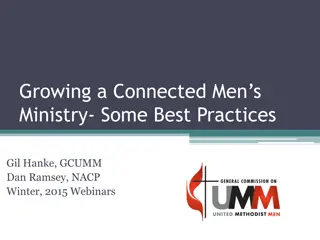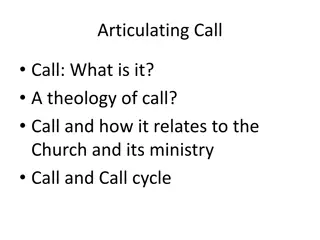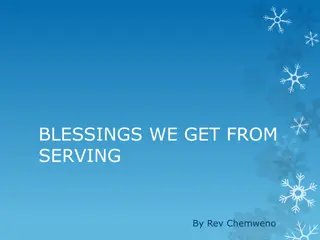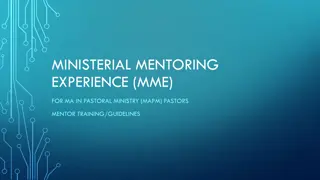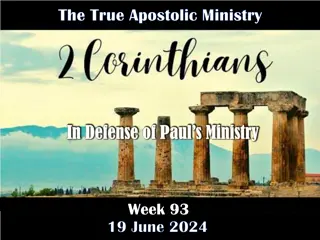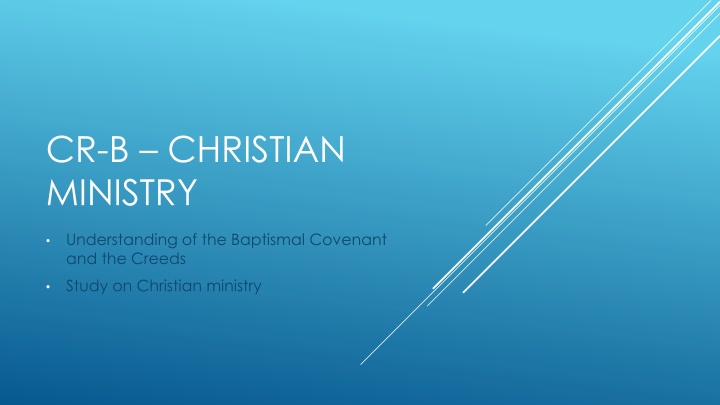
The Baptismal Covenant and Christian Ministry Study
Explore the significance of baptism in Christian ministry, from its historical roots to modern-day debates. Learn about the Baptismal Covenant, creeds, and the sacraments recognized by the Anglican tradition. Delve into the history of baptism from John the Baptist to the Protestant Reformation, examining its meaning and practices throughout the centuries.
Download Presentation

Please find below an Image/Link to download the presentation.
The content on the website is provided AS IS for your information and personal use only. It may not be sold, licensed, or shared on other websites without obtaining consent from the author. If you encounter any issues during the download, it is possible that the publisher has removed the file from their server.
You are allowed to download the files provided on this website for personal or commercial use, subject to the condition that they are used lawfully. All files are the property of their respective owners.
The content on the website is provided AS IS for your information and personal use only. It may not be sold, licensed, or shared on other websites without obtaining consent from the author.
E N D
Presentation Transcript
CR-B CHRISTIAN MINISTRY Understanding of the Baptismal Covenant and the Creeds Study on Christian ministry
2 sacraments recognized by the Anglican tradition: Baptism Eucharist Initiation into community Fabric of being a Christian All Christians have received the spirit through baptism Permanence of baptism once a Christian always a Christian THE BAPTISMAL COVENANT
WHAT DOES BAPTISM MEAN TO YOU?
Beginning with John the Baptist baptising Jesus Prior to John water used for cleansing Spiritual cleanliness In Mesopotamia, water was first sanctified and then sprinkled upon a person. only enter the temple after purification. In Mosaic law, which is the starting point of Judaism Water was used to cleanse both people and things A BRIEF HISTORY
John the Baptist Sent to prepare the way for Jesus Christ Called for the Jewish community to repent of their sins (possibly disobedience to the Mosaic Law) and be baptized to show that repentance. The Great Commission Christ told his disciples to go and make disciples of all nations, baptizing them in the name of the Father and of the Son and of the Holy Spirit In the Apostle Paul s letter to the Christians in Rome, he explains baptism as the rite by which a Christian participates in the death and resurrection of Christ. Becomes an initiation not a purification. THE CHRISTIAN HISTORY OF BAPTISM
The 1st century The name of the Father, the Son, and the Holy Spirit were to be invoked during immersion or pouring of water. The 2ndcentury Infant baptism controversy some believed that they were saved in Christ while others thought that they needed to wait until they could voluntarily ask to become Christians. The 5th century, Saint Augustine, and original sin Saint Augustine wrote that every human being on earth was born with the sin of the first man Adam, called original sin. In this sense, even infants and newborns were sinful. THE CHRISTIAN HISTORY OF BAPTISM (CONTD)
The 16th century, the Protestant Reformation, and the Anabaptists Martin Luther supported infant baptism. He believed in the doctrine of original sin, and that baptism was necessary to cleanse them of that sin. The Anabaptists, or Rebaptizers, were a group within the Reformers. They specifically stood for adult baptism only. The Mennonites, certain Baptist congregations, and the Amish all derive their doctrine from the Anabaptist movement. The 17th century and the Baptist movement Debates on infant versus adult baptism. Modern Debates on Baptism Infant versus adult debates continue The question of whether or not baptism is necessary to salvation is part of a continuing debate since the first century after the life of Christ. THE CHRISTIAN HISTORY OF BAPTISM (CONTD)
the gathering of the community the proclamation of the word the presentation and examination of the candidates thanksgiving over the water the baptism the eucharist THE RITE OF HOLY BAPTISM
The symbol of water is emphasized The celebrant signs candidates with the sign of the cross Chrism restores one of the most ancient baptismal practices Evokes a rich variety of biblical images: the anointing of kings A lighted candle is a sign of their new life in Jesus Christ, the light of the world. THE BAPTISM
Overview of the liturgy THE LITURGY (BAS P152)
Affirmation of the belief in God the Father, God the Son, and God the Holy Spirit. Niceno-Constantinopolitan Creed adopted in 381 Apostle s Creed a shortened version of the Nicene Creed All Christian faiths have a version of the Creeds Renewal of our baptismal vows THE BAPTISMAL COVENANT AND THE CREEDS (P158)
Celebrant Will you strive to safeguard the integrity of God s creation, and respect, sustain and renew the life of the Earth? People I will, with God s help. SOMETHING NEW ADDED (P159)
How does Williams describe the place of the Eucharist in the Christian life? Why? ROWAN WILLIAMS EUCHARIST
What is the mission of God? Hospitality? How do you see yourself as guest at the lord s table? What are we being thankful for? The invitation? P 42. Jesus is not only someone who exercises hospitality; he draws out hospitality from others. Makes other people welcoming P. 43 We are the guests of Jesus. THE INVITATION
P. 43-44 he engages in remaking a community P 45. Without the resurrection, the Eucharist becomes simply a memorial meal, recalling a rather sad and overpowering P 46. Celebrating the Eucharist not only reminds us that we are invited to be guests; it also reminds us that we are given the freedom to invite others to be guests as well. COMMUNITY
P48. Jesus says that this death which is approaching is a door into hope. P 49. Greek word eucharistia, 'thanksgiving', took root and became the earliest and most widespread name for what Christians do when they meet for Holy Communion: they meet to give thanks, even in the heart of the darkest experience. P 49. Connection between the world and God, between human experience and the divine and eternal Giver. HOPE NOT SADNESS
P 51. A doorway into seeing all things as demanding reverent attention, even contemplation as we learn to see our neighbour as God's guest P 51. One of the most transformingly surprising things about Holy Communion is that it obliges you to see the person next to you as wanted by God. P 52. new vision: the gift of seeing things REVERENCE NEW VISION
P 53. confront our capacity to betray and forget the gift we have been given P 53. Holy Communion is no kind of reward: it is, like everything about Jesus Christ, a free gift. P 56. recognize and affirm that the transformation that is going on in Holy Communion is the work of the Holy Spirit REPENTANCE
C (CR-C) Ongoing Prayer Life and Personal Study of Scripture Bible study or understanding of scripture Regular discipline of personal prayer Prayer training NEXT MEETING

